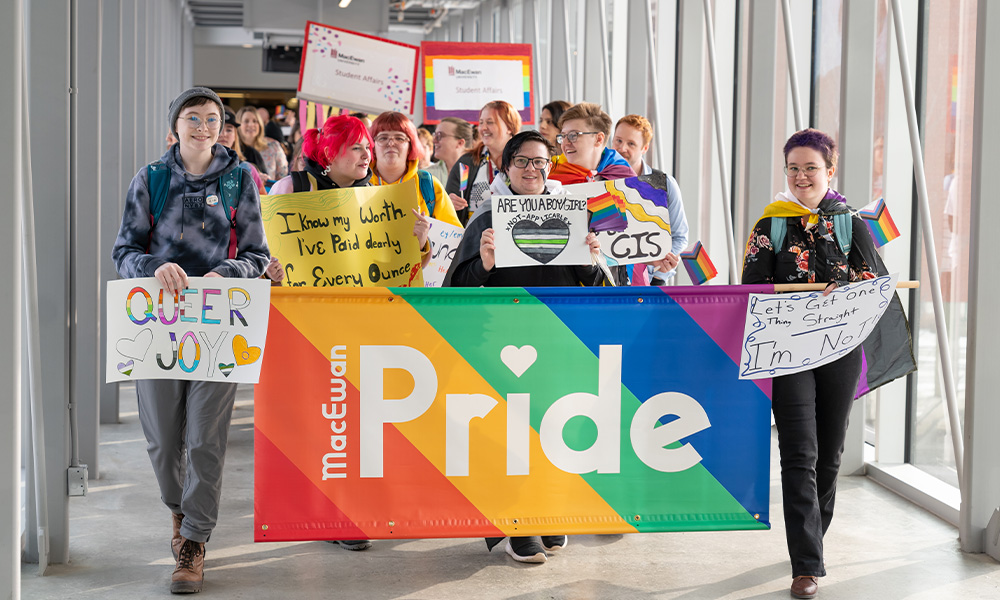Dr. Sarah Copland approaches both stories and students with intersectional, ethical and affective consideration. That openness earned the associate professor in the Department of English a 2023 Distinguished Teaching Award.
Since coming to MacEwan in 2012, Dr. Copland has designed many courses to fill gaps in the curriculum, align with her personal interests and areas of research, and satisfy her drive to ensure that inclusivity is front and centre in her teaching.
“I designed a course for Fall ’22 that focused on how texts represent the intersection of diverse genders and sexualities with diverse races, ages, abilities, ethnicities and religions. And the students who enrolled in the course came from all over campus; it wasn’t limited to English students.”
Dr. Copland began exploring inclusive research topics while earning her PhD at the University of Toronto. While there, she received two teaching awards that gave her new opportunities to offer workshops and talks based on what worked in her classrooms. Her interest in Scholarship of Teaching and Learning (SoTL) continued at MacEwan, where she earned a fellowship to study gender-inclusive language.
“While I learned about designing studies, I thought about what would be of interest to me. I immediately hit on teaching gender-inclusive language in the first-year writing classroom,” she says. “I had been working with a student-faculty group called U-SOLVE for many years up to that point, and I had just become a sexual violence support guide.”
Her initial study asked students in three sessions of ENGL 102 about their use of the singular “they” prior to learning about it in the course and again at the end of the term. She found that, often, students naturally use gender-inclusive language, but didn’t always recognize they were doing so before learning about it in class. Students also reported interest in learning more about inclusive language and how to use it.
“When it comes to teaching any social justice-related language use, like anti-racist language or anti-ableist language, as well as gender-inclusive language, it's not just a question of what we should teach – it's also a question of how we could teach it based on students’ perceptions of how they're already using it,” says Dr. Copland.
She’s currently working on ongoing research into how students’ learning and stress are affected by the ability to make choices in their assessments, alongside Dr. Melissa Hills from the Department of Biological Sciences, and Lisa McKendrick-Calder from the Faculty of Nursing.
“We know that choice is very important to students. What we're studying is how much choice – and what kind of choice – is optimal,” says Dr. Copland.
The initial phase of the study involved offering students in six third-year English courses choices of different texts, questions and deadlines for some of their assignments. Those students were then surveyed on their experiences. The goal is not only to find out what level of choice in assessments students prefer, but also to figure out how to incorporate those choices into courses so faculty can reasonably accommodate them.
“Some students really embrace choice in assessment. But for others, too much choice and flexibility can feel paralyzing,” she says.
Dr. Copland has sat on all three major curriculum-based committees in the English department, demonstrating her commitment to applying her research findings in ways that ensure students can benefit from them at every stage of their student careers.
“I am as invested in my teaching of the first-year program as I am in a senior seminar or topics course,” she says. “Teaching is so central to not just what I do in the classroom and what I do with students, but also to my service and to my research, that it's actually hard to tease them apart in some ways.”
Dr. Copland also extends her work with students beyond the classroom, mentoring Honours English students as they research, write and prepare to present their thesis papers.
“I've learned a lot by reading alongside students, and by conversing with them one-on-one. It's an immense source of pride watching them finally present. I just feel incredibly proud when I get to that point with them,” she says. “It really is a wonderful capstone of MacEwan’s English program.
 Click here for more information.
Click here for more information.
